As an important part of the LINK edu Alliance, the International School has from day one met and implemented the high criteria and official standards that make the prestigious LINK educational community recognisable around the world.
The LINK standards implemented at the International School are the fruit of comprehensive expert analysis of contemporary teaching methods and the use of technology in teaching, the desire to reach the best possible levels of effectiveness in teaching and the need for compliance with the defined, legally established framework.
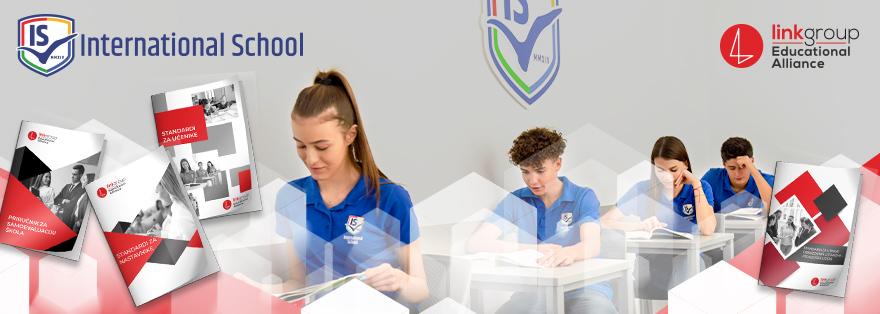
The standards are the result of decades of experience of the LINK Educational Alliance, a prominent member of which is the International School. Owing to the well-tested practices of the world’s best schools and the implementation of high EU standards when it comes to teaching and education quality, the International School has successfully applied these standards for years.
The high LINK standards of excellence are the main reason why the International School is recognised, in the country and throughout the region, as a school that offers a high level of teaching quality and modern approaches, thanks to which its students have no problem continuing their educational journey at the best schools and faculties around the world, as well as in other LINK edu Alliance institutions. The International School carefully and regularly monitors and enhances the implementation of LINK standards so as to make sure our students are always provided with top-quality knowledge.
10 principles behind LINK standards implemented at the International School
1. Quality education is a universal human right and, as such, it is a prerequisite for the successful functioning of the individual and the society.
2. Quality education requires quality work of educational institutions in any circumstances.
3. The implementation of an educational institution’s quality work is the responsibility of educated, qualified and professional expert personnel, in accordance with the defined and legally established standards and regulations.
4. The standards and practices of any educational institutions must be adequate for the needs and requirements of the educational institution in question, the legal requirements, the contemporary needs and the requirements and needs of the individual and the society.
5. The quality work of an educational institution is a prerequisite for the adoption of values and the making of adequate decisions and choices, as well as a prerequisite for success in the private, social and professional life of an individual.
6. The quality of work of an educational institution implies an effective, ethnical, socially responsible and environmentally conscious practice.
7. All members of the educational institution’s community share the common goal of establishing quality education for all students, and collaborate through communication based on respect and understanding.
8. Educational institutions use the Self-Evaluation Handbook for the purposes of self-evaluation, moderation of practice and activities and support to all members of the educational institution community.
9. The quality of work of an educational institution is reflected in ethical, environmental and professional activities, observing the general principles and rules of behaviour and the implementation of activities that contribute to the common good of all the members of the society.
10. All members of the educational institution community continually evaluate, moderate and advance their own practices and activities, assuring the quality of work of the educational institution in the service of all students, teachers, parents and the community, regardless of the
circumstances.
The International School implements LINK standards based on the following documents:
1) LINK standards for teachers
The teachers at LINK edu Alliance’s institutions are required to meet the high standards that imply the synergy of adequate professional competencies, respecting high ethical principles and performing all activities required in order to create the best teaching practices.
LINK standards for teachers constitute the representative points based on which the eachers are obliged to shape their teachers and advance their professional integrity.
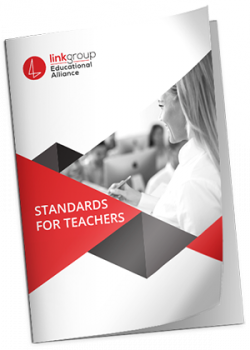
2) LINK standards for leaders in pedagogy
Pedagogy leaders are an important part of the LINK edu Alliance. They are in charge of the advancements of teaching processes and raising the quality of educational institutions.
These standards constitute concrete guidelines that help these leaders advance their own approach, and perform the evaluation of educational institutions with maximum fairness and objectivity.
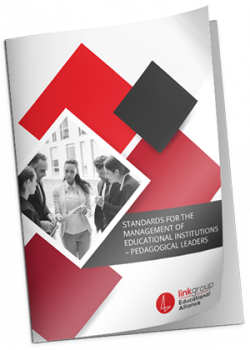
3) LINK standards for students
The standards for students constitute a fruitful blend of values, principles, academic competencies and activities necessary for the promotion of lifelong learning, the development of socioemotional, digital and academic competencies, as well as a responsible attitude towards students’ own work and development and their future.
They contain guidelines and instructions for taking the actions necessary in order to reach the desired outcomes of education. We want every LINK student to be educated in full accordance with 21st century requirements, digitally literate, capable of independent development and critical and problem-based thinking, ready to make a creative contribution to the world around them and professionally meet any challenges of the modern age.
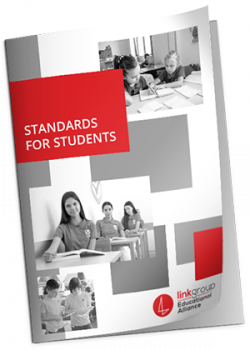
4) LINK standards self-evaluation handbook for educational institutions
Self-evaluation is a very important aspect of the implementation of LINK standards within
individual institutions. It constitutes a way to simultaneously control the quality and advance the existing practices and approaches. Self-evaluation is implemented in order to ensure the highest possible standards and their realization in everyday practice of the educational institutions.
In other words: through the evaluation of the implementation of LINK standards, we evaluate the quality of the educational institution’s work through identifying positive examples and practices that ought to be continued, as well as any elements that ought to be improved. This enables the institutions to plan the necessary measures and procedures concerning the strengthening of the quality of teaching and the standards themselves.
The evaluation is performed by a dedicated team of established experts who check the level of fulfilment of the key indicators of quality teaching based on different sets of information at appropriate times.
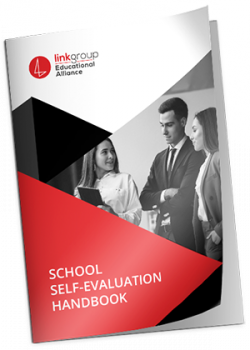
5) LINK Teachers' handbook
The LINK Edu Alliance constantly strives to provide its teachers with opportunities for the best professional development so as to keep our schools’ desired educational outcomes in line with global criteria.
The Teachers’ Handbook provides LINK Edu Alliance teachers with teaching guidelines based on the highest standards applied in contemporary education, and our educational institutions use these guidelines so as to provide students with top-quality education.
Modern 21st-century teachers are required to adapt to the standards applied in schools of the future. Contemporary education has brought new paradigms when it comes to teacher competences, as well as ways to present such an approach to students. Modern forms of knowledge entail a completely new understanding of instruction and the content which teachers are required to master in order to have a responsible attitude towards their work and the students’ progress and future.
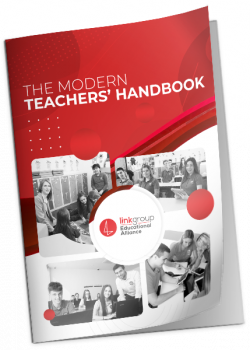
LINKgroup and the International School – for modern education of the highest quality
Like all other LINK edu Alliance institutions, the International School is synonymous with quality when it comes to modern education. Compliance with the highest LINK edu Alliance standards is what distinguishes the International School as the most modern school in the region.
Your child deserves the best possible education and the shared mission of the International School and the LINK edu Alliance is to make sure they receive it.


